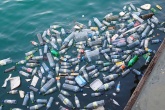£61-million Commonwealth fund to tackle plastic pollution

Prime Minister Theresa May has pledged £61.4 million to tackle marine plastic pollution through a global alliance of Commonwealth states.
The funding package was announced in a speech on Sunday (15 April) in advance of the 2018 Commonwealth Heads of Government Meeting, in which Theresa May also revealed the first countries to have joined the new Commonwealth Clean Oceans Alliance (CCOA).
The CCOA has been jointly set up by the UK and Vanuatu to drive action on plastic waste. So far New Zealand, Sri Lanka and Ghana have joined the alliance, and May hopes to encourage the remaining 48 members of the Commonwealth to follow suit at the Heads of Government Meeting, which takes place over the next four days (16-20 April).
The alliance will work with NGOs and business to share expertise, including the World Economic Forum, Fauna and Flora International, Coca-Cola and Sky, which has been campaigning around the plastics issue through its Sky Ocean Rescue project.
The £61.4-million funding package will go towards practical and research-based projects, with up to five developing countries able to receive partnership support from the Department for International Development (DFID) to help them improve their waste management systems. The DFID has also committed to matching public donations to chosen charities tackling the plastic waste crisis during the latest round of UK Aid Match funding.
Penny Mordaunt, International Development Secretary, commented: “The scourge of plastics is a global environmental challenge, and one that overwhelmingly impacts the livelihoods and health of the world’s poorest people.
“We are joining forces with our Commonwealth partners, bringing together global expertise to stop plastics waste from entering oceans – and by matching pound-for-pound the UK public’s passionate response to the issue, we can make our shared ambition for clean oceans a reality.”
In addition, up to £3 million will be awarded to pilot waste management programmes in two or three developing countries to prevent waste entering the oceans from cities.
Earlier this year, a report from the Chartered Institute of Wastes Management (CIWM) and WasteAid UK, a charity which develops teachable solutions for communities with inadequate or inexistent waste systems, called for a significant increase in overseas spending on waste management projects. The report claimed that mismanaged municipal solid waste in developing countries could account for 50 to 70 per cent of the plastic entering the world’s oceans, and recommended the portion of aid spent on waste management be increased from 0.3 per cent to at least three per cent.
While this new fund is a finite amount rather than a yearly commitment by the UK, a significant portion will go towards helping developing countries prevent waste. £20 million will be put aside to prevent plastic pollution produced by manufacturing in developing countries, £16.4 million will go towards improving waste management at a national and local level, and the remaining £25 million will go towards research projects looking to address the issues ‘from a scientific, technical, economic and social perspective.’
Commenting on the news, Environment Secretary Michael Gove referenced previous UK measures to tackle plastic pollution, stating: “Through this ambitious alliance, we will build on the UK’s world-leading microbeads ban and the five pence plastic bag charge to harness the full power of the Commonwealth in pushing for global change and safeguarding our marine environment for future generations.”
Momentum behind tackling the plastic problem shows no sign of abating in the UK, with the Chancellor of the Exchequer Philip Hammond announcing in March a consultation on how the tax system can be used to reduce single-use plastic consumption.
In addition, a deposit return scheme (DRS) on drinks containers is looking likely for England within the year, also subject to a consultation, with the same promised by the Scottish First Minister Nicola Sturgeon.







